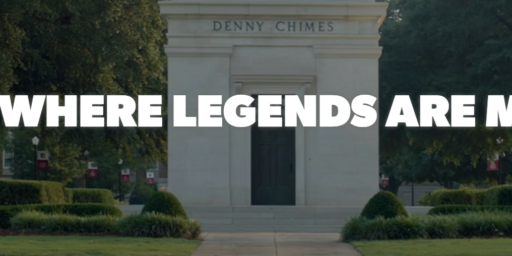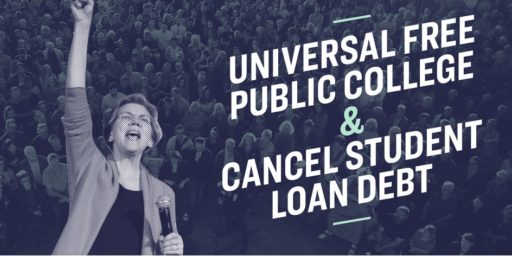College Education: You Don’t Get What You Pay For
King Banaian studies the most recent literature and finds that students are leaving college with record debt levels and that, paradoxically, those attending more selective institutions not only get far more for their money but pay less.
Because students are now willing and able to select higher education in a national rather than regional market, colleges and universities compete more intensely for the best students. At the very best schools, that competition actually drives down the cost of an education that is borne by a student (or parents.) The remainder is paid by an endowment; each graduate in turn pays for good students to come after them. Even though the donations to the alumni fund are higher at the best schools, the total investment made on the best student, and the rate of return on the investment, generate both larger alumni funds and more income for those students.
[…]
[T]he share you pay to go to the less-selective college is higher, and the difference between the amount of spending done by a very selective college and a not selective college (per student) widened from a ratio of about 4 to 1 to nearly 8 to 1 (even though all schools spend more per student nowadays.) Getting into a 99th percentile school just gets you access to so much more, and it seems to get you access to mostly high-quality classmates, where there may be complementarities.
This means that for our public four-year schools, there are fewer high-quality students around; our students are borrowing more to come here, and relatively speaking getting less of an advantage than they would have thirty years ago.
Depressing, if not surprising, news. At less selective institutions, additional students are a net loss, since tuition is less than the cost of delivering the service. So students are paying something like full price.
Meanwhile, not only are the prestigious institutions competing for the best students partly on the basis of tuition waivers and stipends but the graduates benefit from the signaling and networking of the brand and are not only more likely to want to donate to their alma mater’s endowment but more likely to be able to afford to be generous.







I saved this old FastCompany link, on “edupunks”:
How Web-Savvy Edupunks Are Transforming American Higher Education
There are other issues (our High School, Junior College, University balance may not be optimum), even if all else is unchanged an “information age” should lead to lower costs.
I have a quibble with the idea of high quality classmates. What we mean here are grinds.
Warren Buffet has a BS in economics from the U of Nebraska. Bill Gates and Steve Jobs both dropped out of college if memory serves.
Among famous high school dropouts are John Jacob Astor, Bogie, Brando and George Carlin, Mark Twain, Simon Cowell, Henry Ford, Charles Dickens, Benjamin Franklin, Benny Goodman, Ray Kroc, BB King, both Dorothy and Charlie Parker, Wolfgang Puck, Quentin Tarantino, Cornelius Vanderbilt, Aretha, Sinatra and Groucho.
Would you rather spend a night out drinking with the list named above, or with the graduating class of Harvard? Or for that matter, would you invest your money with the list named above, or with the top ten graduating Harvard MBA’s?
I would also add:
Ken Lay: PhD U of Houston
Jeff Skilling: MBA, Harvard
Richard Fuld: MBA, NYU
George W. Bush: MBA, Harvard
I could go on at some length.
Just sayin.
Except that the whole point of this article is that things have changed. Not a single one of the people you named is in the same generation as anyone who has graduated in the past decade. The job market is a whole hell of a lot different now than it was even 15 years ago. And I say this as a bitter man who graduated from a low-tier law school and couldn’t find a decent legal job to save my life. Thank god my bachelor’s degree was from a good engineering school and I had other skills.
I am more and more convinced that a college education for the sake of getting a college education is a waste of money. A college education with a specific goal in mind and a set educational requirement may make it worth it, but I am struggling to see the wisdom of taking on the kind of debt an education costs if a person isn’t going to find a job that will allow them to realistically fit the loan payments into their budgets.
Here is what you get. You can get a BS. Most folks know what that is, next is MS. The M stands for more. Then we have Ph. D Piled higher, deeper. You cannot earn these degrees unless the people heading the department say you can. You must conform to their way of thinking to join the club. Then if you pile it high enough and deep enough, you get to be elite. I just reference the East Anglia CRU incident. Or James Hanson, Ph.D. Men of high ethics. Mann made global warming, collapse.
I’m not sure people have a realistic idea about how much student loan payments are. I finished my Ph.D. with about $68,000 in debt. My loan payments, spread over 30 years, are $274.95 per month. Also, the interest I pay on them is tax deductible (about $1500 per year).
I saw a NYT article this morning that had a link to a map of average student loan debt by state. In my state, SC, average student loan debt was just over $21,000. I think median debt would be a better measure, but so be it.
If payments roughly scale with debt, someone with $21,000 in student loan debt should be paying some $95 or so a month, plus deducting paid interest from taxable income? That doesn’t sound too burdensome to me.
I am all for education. But I don’t like confusing education with what amounts to a certificate of single-mindedness.
Harvard MBA’s just led the charge to a financial system disaster. The minimum security federal prisons could hold alumni meetings for most of the major universities. Did they get an education? Or were they just hard-working grinds who beavered away like drones through high school, college and grad school and came out the other end with an MBA stamp on their foreheads?
I think our educational system is a mess from top to bottom. We used to gear our educational system toward providing GM with assembly line workers. Now it’s geared toward cranking out account managers and lawyers. Schooling is a sort of extended hazing ritual in which anyone with an independent mind, a creative bent or indeed any characteristics other than ambition, greed, and tunnel vision, are driven out.
The result are these brilliantly stupid blind men who managed to destroy their own businesses and damned near took the country down with them.
Steve Jobs took one semester of college and cites as his most useful course: calligraphy. That calligraphy course and what it represents can be seen resonating through everything Jobs has done.
At the Google campus the employees ride bikes, drop between floors on fireman poles, and spend 20% of their work time on personal passions.
And one industry where our world dominance is virtually unchallenged? Entertainment.
I know of a former music major who is now a cable television installer. I suspect he’s having a hard time making the loan payments, with his young family.
I think actually, that would be an improvement.
Even if he is, if he incurred the debt before he started his family, perhaps he should have waited to begin a family. Many people, myself included, delayed marriage and family in order to acquire a degree of professional and financial security first.
Perhaps he shouldn’t have taken on debt to major in music, either. People make choices, and not all of them are good ones.
No one with any sense takes a music major thinking they’ll make money. It has to be for love, in which case I approve.
The only people nowadays making money in the music biz are the performers, the event promoters and Steve Jobs.
Gene Simmons (as in KISS) is widely considered one of the financial geniuses of rock n’ roll. He attended a community college, no music major, no MBA.
So do we have a system geared toward getting 18 year old would-be music majors their loans?
I think so, and that is the background to this whole discussion.
I think many are viewing this as a free choice and free market thing, when it isn’t. It is a subsidized industry in which incentives for the school and the lender are to make the loan, regardless.
You may remember this example of incentive, published October 26, 2006:
More here:
Offering Perks, Lenders Court Colleges’ Favor
I’ll take a free college education from scholarships from a state school any day of the week.
I did.
Most of what you get out of college is what you put into it – especially so with advanced degrees. Perhaps a “good” school can help you land your first job, but ultimately who you are determines where you land years later.